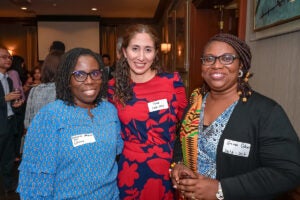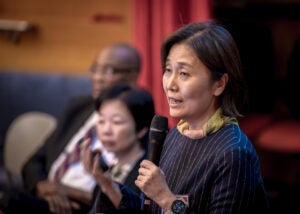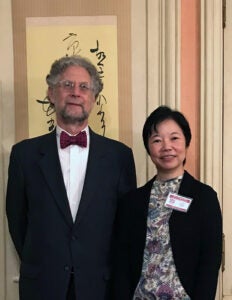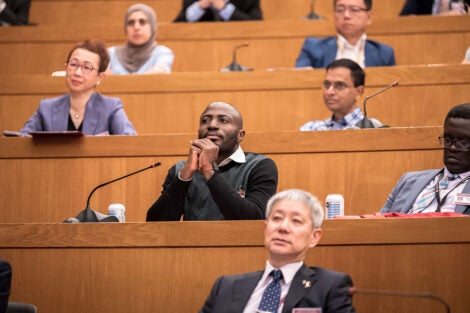November 1, 2023 — More than 90 current and former fellows from the Takemi Program in International Health converged at Harvard T.H. Chan School of Public Health in October for a two-day celebration marking the program’s 40th anniversary. The event included a symposium with talks focused on digital health opportunities and challenges, and networking opportunities for this international community of health policy experts.
The Takemi Program was launched in 1983 by former Harvard Chan School Dean Howard Hiatt and by the late Taro Takemi, who at the time was president of the Japan Medical Association. They conceived of the program as a way to bring together global experts from a variety of fields—including medicine, public health, economics, law, and politics—to find effective and equitable solutions to the development and distribution of health care resources. Since then, 323 Takemi Fellows from 61 countries have taken part in the program.

Fellows audit classes at Harvard, conduct their own research, attend weekly seminars, and learn from each other—with a lot of flexibility. It’s a chance for mid-career professionals to take time away from their daily obligations to explore big questions and change-making work. Many have gone on to serve in leadership positions in their own countries, such as ministers of health, deans of schools, and founders of organizations.
“The Takemi Program is recognized at the School and around the University for its capacity to attract future leaders in public health and for its contributions to global health,” Interim Dean Jane Kim said at the celebration’s opening reception, held October 20 at Harvard Faculty Club. “Indeed, every global health meeting these days has former Takemi Fellows in attendance, on topics from health financing reform to malaria control to innovative strategies for advancing universal health coverage.”
Symposium on digital health

At the next day’s symposium, Takemi Program Executive Director Jesse Bump—a fellow in 2010–2011—reflected on the important role the fellowship played in his own career. “The program makes us better versions of ourselves,” he said.
Following their time in the program, fellows join a global cadre of experts who continue to collaborate and support each other.
“The wonderful networks among the fellows beyond national boundaries can be the most important driving force to create a more peaceful, stable, and healthy world with no one left behind,” Keizo Takemi, Taro’s son and a fellow in 2007–2009, said in remarks delivered remotely at the symposium. Takemi was recently appointed Japan’s minister of health, labor, and welfare.

Talks at the symposium included a keynote address from África Periáñez, co-founder and CEO of Causal Foundry, a company that uses machine learning to personalize medicine, health care delivery, and patient support, especially in low- and middle-income countries. Takemi fellows presented research on a range of topics including uses of mobile technology to address gender-based violence in rural Nigeria, and the role of digital health in Taiwan’s national insurance system. Prakash Gupta, a fellow from the program’s first cohort (1984–85) returned to moderate a panel. Gupta, a distinguished chronic disease epidemiologist, is the founding director of Healis-Sekhasaria Institute of Public Health in Mumbai, India.
Yutaka Aso, a member of the Takemi family who runs a large hospital in Japan, said he would be taking back lessons learned at the symposium. “The digital health tsunami is coming,” he said, noting both the opportunities and potential risks in that area.
The benefits of being together

In his closing remarks, Michael R. Reich, the program’s longtime director and Taro Takemi Professor of International Health Policy Emeritus, said that the meeting was both a substantive exploration of the research and an opportunity for non-digital communications. “It reminds us, having come through the pandemic, that in-person meetings actually make a difference, because of human contact and the unexpected things that happen when you talk to other people—and the opportunities for learning.”
Reich closed the celebration by passing the torch to his successor Aya Goto, Professor of Health Information and Epidemiology at Fukushima Medical University in Japan and a Takemi Fellow in 2012–2013. Goto will join Harvard Chan School as Takemi Professor of the Practice of International Community Health and director of the program on January 1.
Photos: Susan Symonds; Reich and Goto courtesy of Michael Reich
